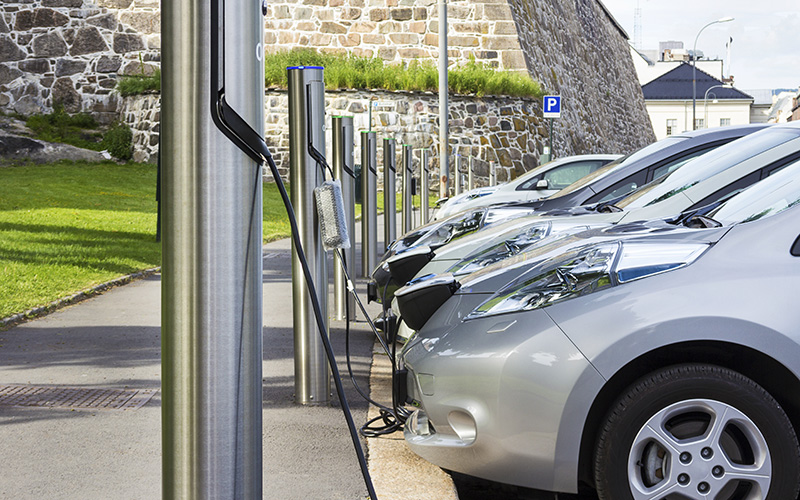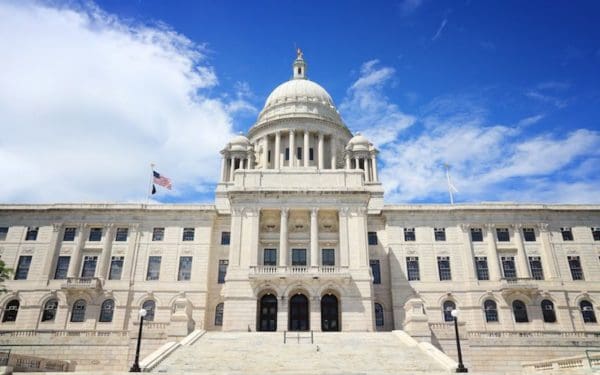
No one deserves to breathe in the dirty fumes or shoulder the climate impacts from tailpipe pollution. We need stricter clean cars and trucks standards to get away from fossil fuel powered cars. Photo: Shutterstock.
It was a crisp Sunday morning in late-May as I got my daughter ready for one of my favorite activities of the month: the annual fish run. Dappled sunlight danced through waving trees, beckoning us over trails leading to the fish ladder. We greeted the brook with the same enthusiasm as the alewife dorsal fins skimming along the water’s surface. The energy and life submerged beneath mirrored my daughter’s rich laughter. At this moment, I couldn’t help but reflect on how much I love New England.
But these fish, their home, and the world at large are under threat from climate change. Luckily, New England has the chance to push hard against the crisis by targeting the sector most responsible for climate-damaging pollution: transportation. I want my daughter to be able to show her children the magic of the Narrow River fish run (and New England’s other wonders) when she grows up, without the worsening impacts of climate change looming.
There are two sets of standards that can help. Here’s how:
Bringing More Clean, Electric Cars into New England
The first set of standards is called Advanced Clean Cars II. These standards are focused on the vehicles you and I drive around and require automakers to sell an increasing percentage of fossil fuel-free vehicles each year. By 2035, every vehicle they sell must not use any climate-damaging fuel. That means dealers will have more new and used electric cars and SUVs for sale, making it easier for families to purchase one. The standards also tighten up tailpipe emissions mandates for new gas-powered cars by limiting the amount of dust, dirt, soot, and smoke allowed to pollute our air.
Why electric? Because the gas that powers our cars spews toxic and climate-damaging exhaust fumes filled with carbon dioxide, carbon monoxide, and even benzene. Not to mention, low-income and communities of color suffer the most health harms from these pollutants because they’re more likely to live near highways and car-congested areas where these noxious fumes linger. Electric vehicles—which have no tailpipe and don’t burn polluting fuels— will slash these air- and climate-damaging emissions, ensuring everyone benefits from cleaner air and a healthier climate.
Right now, Massachusetts and Vermont are leading New England in adopting these new standards with Rhode Island and Connecticut expected to follow suit. By adopting Advanced Clean Cars II, states send a strong message to automakers that New Englanders want electric cars – now.
We Need Electric Trucks and Buses, Too
The next set of standards is called Advanced Clean Trucks. These standards target medium- and heavy-duty vehicles like buses, box trucks, tractor-trailers, and vans. Like Advanced Clean Cars II, these standards would require automakers to sell more fossil fuel-free medium- and heavy-duty vehicles. It would also regulate the amount of polluting emissions they spew.
Slashing this pollution is especially important because our trucks and buses often rely on the dirtiest fuels, like deadly diesel. Diesel has a long history of polluting our air and climate. This fuel is linked to asthma and other respiratory illnesses. It also aggravates preexisting conditions like heart and lung disease. Worse, the public health impacts of diesel disproportionately affect communities already overburdened by environmental hazards, such as communities of color or those with low socioeconomic status.
Paving the Way to Net Zero by 2050
I’m proud that nearly every New England state, including my childhood home of Rhode Island, has passed mandatory climate laws demanding cuts to climate-warming emissions by 2050. But commitments without action are just empty promises. We deserve a future where our children and loved ones can enjoy the very things we cherish right now. We are dedicated to ensuring our climate action is bold and urgent enough to actually slow the crisis and protect New England’s families and environments.



